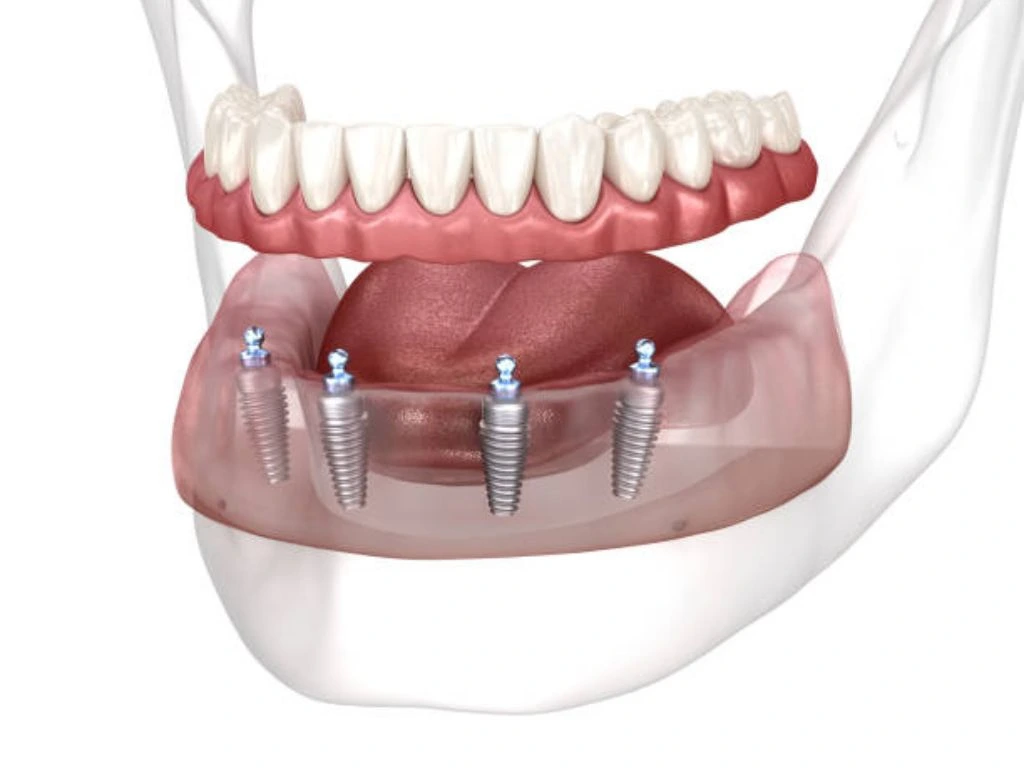The missing teeth can be a concern and impacts on your confidence, the ability to eat comfortably are essential for overall oral health. So the Implant supported bridges or dentures provides a natural looking and long lasting solution to restore your smile and improve your daily functions. In this article, We will explore a Detailed guide for implant supported dentures, Read it’s benefits and the cost of implant supported dentures and why they are worth considering for your dental restoration needs.
What Are Implant Supported Dentures?
Implant supported dentures are a type of a dental treatment that combines dental implants with custom made dentures or bridges to replace missing teeth. These implants act as artificial tooth roots, providing stability and support for the attached dentures or bridges. This techniques replicates the function of natural teeth and ensures more secure fit and prevents during eating or speaking.
How Implants and Dentures Work Together for Better Oral Health
Dental implants plays a crucial role in oral health by stimulating the jawbone. Which helps in prevent of bone loss, it is a common issue after losing teeth. This stimulation preserves the structure of your jaw, which is essential for maintaining a facial appearance and ensuring the long term stability of your dental restoration. When paired with custom dentures, implants helps create a stable, and comfortable solution that looks and functions like natural teeth, together implants or dentures can improve your ability to chew, speak and smile confidently.
The Benefits of Implant-Supported Dentures
1. Natural Appearance and Feel
Implant supported bridges and dentures look, feel and function just like you natural teeth. They are custom made to match the shape, size and color of your existing teeth and provides a seamless smile. Since they are anchored into the jawbone, implant supported dentures dont’t shift or slips, giving you a more natural feel when speaking or eating.
2. Long-Lasting Durability
When properly cared for, implant-supported bridges and dentures can last many years, making them a worthwhile investment in your oral health. The implants are made from durable titanium, which combines with your jawbone for a permanent, stable solution.
3. Preservation of Jawbone Health
The most significant advantages of implant supported dentures is their ability to stimulate the jawbone, preventing the bone loss typically associated with missing teeth. Traditional dentures, which rest on gums, cannot offer this benefit, making this option a good choice for long term oral health.
4. Improved Speech and Chewing
Traditional dentures can sometimes slip or become loose, which affects speech and chewing ability. Implant-supported bridges and dentures remain securely in place, allowing you to Eat and speak a clearly a comfortably.
5. Increased Confidence
Whether you’re eating or speaking, the implant supported dentures provide confidence by giving you a secure, natural feeling solution. There is no need to worry about dentures slipping out of place and you can regain the confidence to smile.

Preparing for Dental Implant Bridges
Before undergoing treatment for implant-supported bridges or dentures, there are several steps involved in the preparation process. These steps are designed to ensure that the treatment is suitable for you and that your results will be long-lasting.
1. Consultation and Evaluation
Your journey begins with a consultation, during which the dentist will take X-rays and 3D scans of your mouth to analyse your oral health and the condition of your jawbone. The dentist will also review your goals, medical history, and determine whether you are a suitable candidate for implant-supported bridges.
2. Bone Density Check
Since implants require a solid foundation in the jawbone, your dentist will evaluate the density and health of your jawbone. In case wehre the boss may occur, you need a bone graft to build up the bone before the implants can be placed.
3. Treatment Plan
Once your evaluation is complete, the dentist will develop a personalized treatment plan, outlining the number of implants needed, the timeline for healing, and the overall procedure.
The Implant Procedure
1. Surgical Implant Placement
The first stage involves the surgical placement of dental implants into your jawbone. Under local anesthesia (or sedation if needed), small titanium posts are inserted into the bone to act as artificial tooth roots. This procedure typically takes 1-2 hours per implant, and you may experience mild discomfort, swelling, or soreness afterward, which will subside within a few days.
2. Healing and Osseointegration
While the implants are placed, they need time to fuse with the jawbone in a process called osseointegration. This healing period can take between 3 to 7 months. During this time, temporary dentures or bridges may be provided to help you maintain function and appearance while the implants heal.
3. Abutment Placement and Crown Fitting
After osseointegration is complete, a small connector piece known as an abutment is attached to each implant. Your dentist will then take impressions of your mouth to create a custom bridge or denture, which is permanently attached to the abutments. The final step involves securing the dental restoration in place, giving you a functional and natural looking smile.
Aftercare and Maintenance for Dental Implant Bridges
Taking care of your implant-supported dentures is essential for maintaining their longevity and ensuring optimal oral health. Here are some key aftercare tips:
1. Oral Hygiene
Although implant supported bridges are not susceptible to decay, proper oral hygiene is still crucial. Brush your teeth 2 times a day, floss regularly and use an antibacterial mouthwash to keep your gums and implants healthy.
2. Regular Dental Checkups
Visit your dentist regulary for checkups and cleanings. This checkups will knew dentist to monitor the condition of your implants, bridges and overall oral health.
3. Dietary Considerations
While implant-supported dentures allow you to enjoy most foods, avoid hard or sticky items that could put unnecessary strain on your new restoration.
Best Candidates for Dental Implant Bridges
While implant-supported bridges offer numerous benefits, they may not be suitable for everyone. The ideal candidate for implant-supported bridges or dentures should have:
- Good overall health, with no untreated dental issues like gum disease.
- Adequate jawbone density to support implants (if needed, bone grafting can help).
- A commitment to proper oral hygiene and regular dental visits.
- A non-smoking lifestyle or willingness to quit smoking, as smoking can interfere with healing and implant success.
- Your dentist will assess your suitability during the initial consultation.
How Long Does It Take to Get a Dental Implant Bridge?
The total time line for getting implant supported bridges can vary from patient to patient. On average the entire process, from the initial consultation to the final placement of the bridge, can take time from 5 months to one year. This timeline accounts for healing time during osseointegration, which is important for ensuring the success of the implant.
Here’s a general breakdown:
Consultation and Planning: 1-2 weeks.
Surgical Placement: 1-2 hours per implant.
Healing and Osseointegration: 3-7 months.
Abutment and Crown Placement: 1-2 weeks.
Is It Worth Investing in an Implant-Supported Bridge?
Considering the benefits of implant supported dentures for many patients find the investment worthwhile. While the initial cost may be higher than traditional dentures or bridges, the long term durability, functionality and oral health benefits of implant-supported dentures can make them a more cost effective solution over time.
Cost of Implant-Supported Dentures
The cost of implant supported dentures, depends on certain factors including number of implants needed, the materials used and the dentist fees. On average, the cost can range from $4000 for rach pontic (custom made or artificial tooth in the bridge).
Most dental clinics, including ours offers financing options and consultations to discuss pricing in more detail.
Implant supported bridges and dentures provides a stable, long lasting and natural looking solution for those who are dealing issues with missing teeth. Whether you are considering the procedure for improved chewing, speech or overall oral health, this option can provide you with enhanced comfort and confidence.
If you are seeking for Implant supported dentures in Liverpool,Sydney look not further than Family Dental liverpool for expert care. Our clinic is conveniently located on liverpool’s Elizabeth drive, we offer consultations to discuss cost of implant supported dentures and personalized treatment plans. Investing in implant supported bridges in not just an investment in your smile but a overall dental care. Let us help you to restore your smile, one tooth at a time!
FAQs
Implant-supported dentures can last many years or even a lifetime with proper care and maintenance.
Most patients experience minimal discomfort during the procedure due to the use of anesthesia. Some swelling and soreness may occur afterward, but it can usually be managed with pain relief medication.
Typically, the process involves multiple visits. While the initial placement of implants may occur in one visit, healing and final restoration can take several months.
If you lack sufficient jawbone, your dentist may recommend procedures like bone grafting to build up the bone before placing implants.
Good candidates are those with missing teeth and enough healthy jawbone to support the implants. Your dentist will evaluate your oral health during a consultation.
Yes! Implant-supported dentures are designed to function like natural teeth, allowing you to enjoy a wide variety of foods comfortably.
The cost varies based on the number of implants needed and the materials used. Consultations are available to discuss pricing and financing options.
You can find implant-supported denture services at local dental clinics in Liverpool, including Family Dental Liverpool, located on Elizabeth Drive. Here, you can receive expert care and personalized treatment plans.
